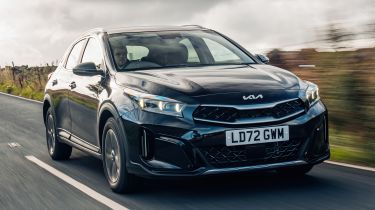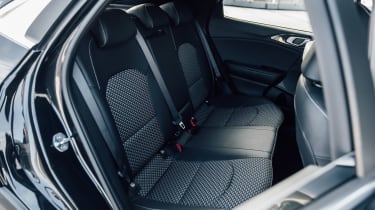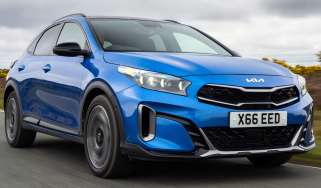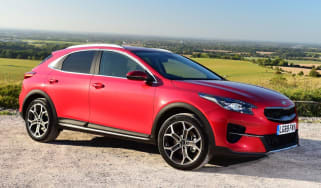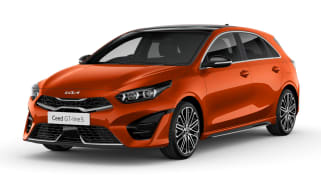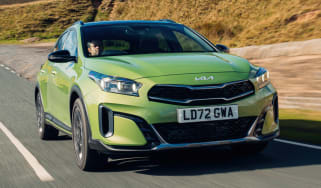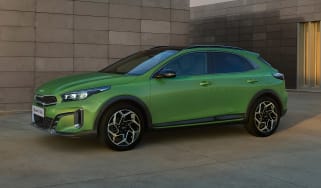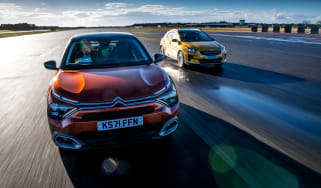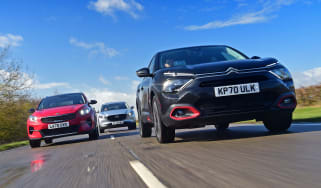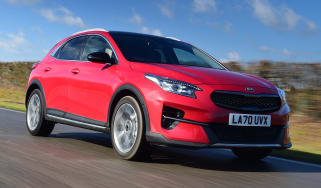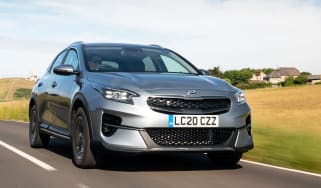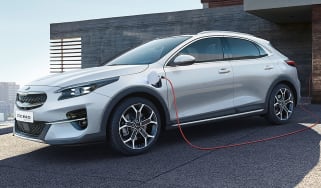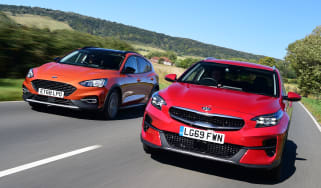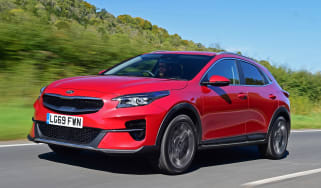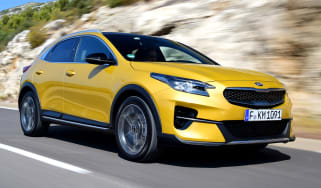Kia XCeed review
The jacked-up Kia XCeed adds some extra practicality to the Ceed model family

As a stylish, slightly more practical alternative to the Kia Ceed hatchback, the Kia XCeed fills a niche in the South Korean manufacturer’s range. It’s about the same size its Niro stablemate, but more akin to rivals like the Toyota C-HR in its combination of design flair and driver focus.
Standard equipment is generous, there’s more space inside than you’ll find in the Ceed hatch and the XCeed is both more comfortable and more fun to drive than its conventional hatchback sibling. However, the XCeed’s place in Kia’s range means there’s plenty of competition from within – a Kia Sportage is a great choice if you want a full-blown SUV, while the Kia Niro offers low day-to-day running costs.
About the Kia XCeed
The XCeed fills the gap between the Stonic and Niro in the Kia range, but is about the same size as the latter. It's positioned as the more stylish choice, its sharp looks setting it apart and taking the fight to more expensive, premium-badged rivals like the Mercedes GLA and Audi Q2. Other rivals include the Toyota CH-R, Mazda CX-30, Volkswagen T-Roc and the MINI Countryman.
A facelift in 2022 brought in some exterior styling changes which give the XCeed a fresher feel, while the engine and trim options have been streamlined. The 2 and 3 specifications are now joined by the GT-Line and GT-Line S in the lineup, while there's a 158bhp 1.5-litre petrol engine offered alongside a 139bhp plug-in hybrid unit. The 118bhp 1.0-litre three-cylinder petrol engine is no longer available from new.
Used - available now

2020 KIA
Xceed
60,351 milesManualPetrol1.4L
Cash £12,197
2024 KIA
Xceed
12,731 milesManualPetrol1.5L
Cash £17,644
2022 KIA
Xceed
39,195 milesManualPetrol1.5L
Cash £15,544
2022 KIA
Xceed
77,843 milesAutomaticPetrol1.6L
Cash £11,300The XCeed plug-in hybrid model is powered by a 1.6-litre petrol engine, with an 8.9kWh battery and a 59bhp electric motor, delivering around 30 miles of electric range. The PHEV uses a six-speed DCT automatic transmission, while the pure petrol model comes with a six-speed manual gearbox, although there is the option of having the DCT auto in combination with the GT-Line S trim. Despite its SUV-inspired looks, the XCeed is available exclusively with front-wheel drive.
Regardless of your trim choice, the XCeed comes with great standard equipment. The entry-level 2 gets 16-inch alloy wheels, LED headlights, cruise control and a parking camera, plus Android Auto and Apple CarPlay connectivity – more than enough kit for most buyers. The step up to 3 trim adds a heating function for the front seats and steering wheel, along with a bigger 10.25-inch infotainment screen, rear privacy glass and keyless go.
The 3 and GT-Line versions are similarly equipped, although the GT-Line offers sportier touches such as black exterior trim, aluminium pedals and a flat-bottomed steering wheel. The GT-Line S delivers luxury extras such as a panoramic sliding sunroof, black leather upholstery, a 12.3-inch digital driver's display and a wireless charging function.
All XCeed models feature hydraulic bump stops and reworked suspension that give a smoother, softer ride than its Ceed sibling; the result is a car that’s relaxing to drive and settles down nicely on the motorway. It’s good to drive on twistier roads, too; the raised ride height doesn’t impact negatively on the car’s handling.
Elsewhere, there’s a boot that’s usefully larger than the Ceed hatchback’s and a bit more space in the rear for passengers. If you like the idea of a small SUV that’s stylish, practical and good to drive, the Kia XCeed is worth a test drive.
Engines, performance and drive
The XCeed is closely related to the Kia Ceed hatchback; it’s based on the same platform and uses the same engines. To achieve its rugged look, the XCeed sits higher than its hatchback relative thanks to a 20mm boost in ride height and larger-sidewalled tyres.
Kia has fitted softer springs along with hydraulic bump stops, both of which help to provide a smoother, more pliant ride than that on the standard Ceed. The XCeed settles down nicely on flowing roads and motorways, making short work of longer distances.
This softer edge means the XCeed is actually better to drive than the Ceed hatch. It’s more comfortable and relaxing to drive, with fewer lumps and bumps transmitted into the cabin. There’s a little more body roll in corners versus the standard car, but this means the XCeed is a touch easier to read when driving quickly. The unchanged electric power steering system remains accurate and well-weighted.
Minus points are awarded for the XCeed’s clunky six-speed gearbox, while the six-speed DCT automatic transmission in the XCeed PHEV is lazy in its operation.
0-62mph acceleration and top speed
The 1.4-litre petrol engine is no longer available, but if you track down a used example you'll find it provides adequate performance, although it doesn’t feel fantastic under larger throttle inputs, sounding strained in its upper registers. 0-60mph (Kia doesn’t quote 0-62mph times) takes 9.1 seconds with the manual gearbox or 9.2 with the automatic; top speed is 124mph.
Also off the price list are the the 1.0-litre three-cylinder petrol and 1.6-litre diesel - offered in 114bhp or 134bhp forms. Respective 0-60mph times are 10.9s , 11.0s and 10.2s.
The current 158bhp 1.5-litre petrol is a more powerful performer, managing the benchmark sprint in 8.7 seconds, while the plug-in hybrid model needs 10.6 seconds to reach 62mph from a standstill.
MPG, CO2 and running costs
The 2022 facelifted XCeed model offers more than just cosmetic exterior changes and upgraded onboard tech - the front foglights have been repositioned into the headlight clusters, while Kia has introduced a pair of air curtains, which are designed to guide air around the wheels and help reduce drag and improve fuel economy.
The 1.0-litre petrol model has been discontinued from the XCeed range, but with average fuel economy (on the WLTP combined cycle) of 47.1mpg, it could be worth exploring as a used model. The current 158bhp 1.5-litre returns up to 46.3mpg depending on which trim level and wheel size you opt for, while CO2 emissions range from 137g/km to 143g/km.
For the ultimate in economy, the XCeed plug-in hybrid is by far the front-runner. Priced at around £33,000, it's the most expensive model in the range, but offers around 30 miles of all-electric range which is perfect for the urban commute. Overall fuel economy is rated at 201mpg, but you'll have to ensure the battery is regularly topped up to achieve anything like that in real-world driving.
With CO2 emissions of just 32g/km, the XCeed plug-in model will be particularly appealing to company car users as it attracts a 12 per cent Benefit-in-Kind tax rate for 2023/24.
Insurance groups
Although it's the most expensive model to buy, the XCeed plug-in hybrid is in group 15 for insurance (out of 50), whereas the 1.5-litre petrol versions are in group 17 or 18, depending on specification.
Depreciation
Residual values for the XCeed are reasonable, with all petrol and plug-in hybrid models averaging around 44 per cent after a typical three-year/36,000-mile ownership period. The one exception is the 1.5-litre petrol version in top-of-the-range GT-Line S trim, which is predicted to hold onto 39 per cent over the same three-year period.
To get an accurate valuation on a specific model check out our free car valuation tool...
Interior, design and technology
Kia has a good reputation for producing well-made cars with quality interiors and – as of recently – styling exteriors. The XCeed is a car that will sell almost entirely on the latter, with its coupe-like lines and jacked-up suspension feeling particularly on-trend. It’s a car that looks more expensive than it is, ready to take on the likes of the Mercedes GLA in the style stakes.
The XCeed shares its underpinnings with the Ceed hatch but its body is almost completely new – only the standard car’s front doors are carried over to the crossover. It’s about the same size at the aforementioned Mercedes GLA and Toyota C-HR.
Inside, Ceed owners will be in familiar territory – but that’s no bad thing. The dashboard is clearly laid out, features good quality plastics and is firmly screwed together. An infotainment screen sits high on the dash, measuring 8.0 or 10.25-inches depending on trim; a conventional rev-counter and speedometer flank a central information screen that can display trip information, sat-nav directions and other useful readouts.
Sat-nav, stereo and infotainment
Kia’s tried-and-tested infotainment system features here and is still one of the best around; intuitive to use and packed with plenty of desirable features. Android Auto and Apple CarPlay connectivity come as standard, displayed on the 8.0-inch screen on entry-level 2 models or on the 10.25-inch screen that comes with all other versions. Features like wireless phone charging and a reversing camera are also added as you climb up the trim levels.
A six-speaker audio system is standard, as is Bluetooth connectivity with voice recognition and music streaming support, while top-tier cars in GT-Line S trim get a punchier eight-speaker JBL sound system. Unlike some rivals, Kia keeps its options lists sparse but packs each trim level with as much kit as possible – this keeps the buying process simple to understand. Want more equipment? Choose a higher trim.
Practicality, comfort and boot space
The XCeed is spacious enough for a car in this class, offering marginal improvements over the Ceed hatch on which it’s based. The XCeed is 85mm longer than the Ceed and so passenger and boot space has increased slightly – but Ceed owners won’t notice a massive difference. Elsewhere, the familiar platform means that the driving position is good, while all-round visibility is acceptable despite the sleek roofline.
The cabin is fairly practical with good-sized door bins, a mobile phone cubby ahead of the gear lever and two cupholders in the centre console. A larger cubby is located under the centre armrest. Other nods to increased practicality include luggage hooks in the boot, a roof-mounted sunglasses holder and – in top-spec GT-Line S cars – 40:20:40 split-folding rear seats.
Dimensions and size
The XCeed measures in at 1,495mm tall, 1,575mm wide (or 1,826mm including mirrors) and 4,395mm long. It’s about the same size as the Mercedes GLA and exactly the same length as the Mazda CX-30, though its Japanese rival is wider at 1,795mm, minus mirrors.
Leg room, head room & passenger space
Despite its SUV-alike looks, the difference in passenger space front and rear between the XCeed and Ceed is marginal to the point of being imperceivable. Space is still respectable though, with plenty of space for four adults to sit in comfort, or five at a slight squeeze. Comfort in all seats is good, with plenty of support and adjustability, especially in higher-spec models. Isofix points feature on the outer rears, while these are also heated in top-spec GT-Line S versions.
Boot space
The XCeed’s increase in length over the Ceed hatch is evidenced most inside by the increase in load volume – an increase of 31 litres brings the boot to 426 litres. Fold down the rear seats (60:40 as standard, 40:20:40 on the GT-Line S) and this increases to a total of 1,378 litres. For comparison, the Mazda CX-30 has 430 litres with the seats up and 1,406 litres with them folded – although these figures include underfloor storage.
Towing
XCeed models fitted with the (now discontinued) 1.0-litre petrol or either of the 1.6-litre diesels can tow a braked trailer weighing up to 1,200kg. The 158bhp 1.5-litre petrol offers a little more capacity at 1,410kg, while the PHEV has a 1,300kg limit.
Reliability and safety
Kia’s reputation for reliability and safety means you can choose any of its models with confidence. The XCeed is packed with active safety kit, with lane-keep assist, automatic emergency braking, hill-start assist, traffic-sign recognition and cruise control all fitted as standard. Top-spec GT-Line S models get the full complement of systems, including an Intelligent Speed Limit Warning function and a blind-spot collision warning.
Euro NCAP is yet to test the XCeed individually, but the closely related Ceed hatch scored a full five stars when fitted with its optional safety pack. We expect the XCeed will manage the same score.
The XCeed finished in twelfth spot in our 2023 Driver Power customer satisfaction survey, while the Ceed hatch was just ahead in 10th place on the 75-car list. Kia itself achieved sixth position on a list of 32 manufacturers which, although a positive result, is down from third the previous year.
Warranty
Kia offers an industry-leading warranty on all of its cars that features seven years and 100,000 miles of coverage. Only sister company Hyundai’s unlimited-mileage five-year warranty comes close.
Servicing
Kia recommends that petrol XCeed models are serviced every 12 months or 10,000 miles, whichever comes first. The discontinued diesel models can cover 20,000 miles before needing a service, but the same 12-month limit applies.
Kia offers a range of pre-payment plans for servicing, marketed under the Kia Care brand – these can be paid monthly and are transferable between owners. The company also offers fixed-price MoT tests.
